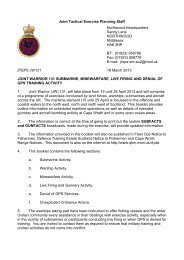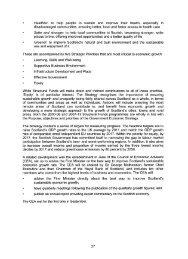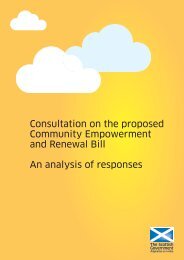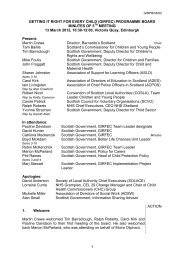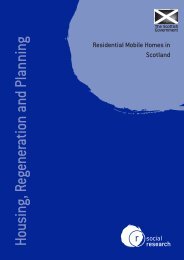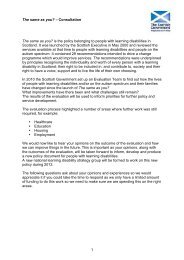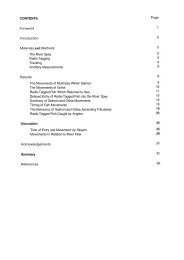National guidance for child protection in Scotland - Scottish ...
National guidance for child protection in Scotland - Scottish ...
National guidance for child protection in Scotland - Scottish ...
You also want an ePaper? Increase the reach of your titles
YUMPU automatically turns print PDFs into web optimized ePapers that Google loves.
Risk tak<strong>in</strong>g behaviours as a result of early abuse, e.g. drug tak<strong>in</strong>g, can then<br />
impact on parent<strong>in</strong>g behaviours and the social environment, which can then lead<br />
to further abuse. Early <strong>in</strong>terventions are thus crucial given the develop<strong>in</strong>g bra<strong>in</strong>.<br />
However, it is important to note that <strong>in</strong>tergenerational cycles of abuse are not<br />
<strong>in</strong>evitable, and there are many stages where decreas<strong>in</strong>g risk factors and<br />
<strong>in</strong>creas<strong>in</strong>g protective factors can break this k<strong>in</strong>d of cycle. Much can be learned<br />
from studies where <strong>in</strong>dividuals have encountered severe adversity and<br />
maltreatment <strong>in</strong> <strong>child</strong>hood, yet have not repeated this <strong>in</strong> their own parent<strong>in</strong>g<br />
behaviours (Harris & Dersch, 2001).<br />
Domestic Abuse<br />
In the last national prevalence study, 26% of <strong>child</strong>ren and young people reported<br />
physical violence dur<strong>in</strong>g their <strong>child</strong>hood (Cawson, Wattam, Booker, & Kelly,<br />
2000). Results from the recent NSPCC prevalence study show that a quarter of<br />
<strong>child</strong>ren who live with domestic abuse experience are physically abused<br />
themselves (Rad<strong>for</strong>d, Corral, Bradley, Fisher, Bassett, Howat et al., 2010). It is<br />
important also to understand that the impact of domestic abuse can endure <strong>for</strong><br />
<strong>child</strong>ren long after the measures have been taken to ensure their safety (Holt,<br />
Buckley, & Whelan, 2008).<br />
We know that the rates of <strong>child</strong> abuse and neglect are 15 times higher than the<br />
national average where domestic abuse is an issue, <strong>in</strong>deed <strong>in</strong> three out of five<br />
cases of maltreatment, domestic abuse is also an issue. Not only is there a l<strong>in</strong>k<br />
between domestic abuse and maltreatment, domestic abuse can impact on<br />
parent<strong>in</strong>g abilities; it jeopardises the developmental progress and personal<br />
abilities of <strong>child</strong>ren, contribut<strong>in</strong>g to cycles of adversity; and it disrupts broader<br />
family function<strong>in</strong>g and the home environment (Buckley, Holt, & Whelan, 2007).<br />
The impact on their wellbe<strong>in</strong>g can <strong>in</strong>clude a range of physical, emotional and<br />
behavioural consequences – low self esteem, depression, PTSD, aggression,<br />
runn<strong>in</strong>g away from home and risk tak<strong>in</strong>g behaviour (Hester, Westmarland,<br />
Gangoli, Wilk<strong>in</strong>son, O’Kelly, Kent et al., 2006). The association between<br />
domestic abuse, harm to <strong>child</strong>ren’s health and use of health services is not<br />
straight<strong>for</strong>ward but known adverse consequences <strong>in</strong>clude heightened risks of<br />
under immunisation and of risk tak<strong>in</strong>g behaviour <strong>in</strong> adolescence (Bair-Merritt,<br />
Blackstone, & Feudtner, 2006; Webb, Shankleman, Evans, & Brooks, 2001).<br />
Parental Mental Ill Health<br />
Approximately one <strong>in</strong> six adults <strong>in</strong> Brita<strong>in</strong> has been diagnosed with a neurotic<br />
disorder such as depression, anxiety or phobias (Office of <strong>National</strong> Statistics,<br />
2001). In addition, approximately five <strong>in</strong> 1,000 people surveyed were assessed<br />
as hav<strong>in</strong>g a severe mental disorder such as schizophrenia or bipolar depression.<br />
It is hard to capture the effects of mental illness as it may vary and be perceived<br />
differently from case to case.<br />
Studies have shown some of the negative effects <strong>for</strong> <strong>child</strong>ren who have parents<br />
with mental illness (Aldridge, 2006; Stallard, Norman, Hul<strong>in</strong>e-Dickens, Salter, &<br />
Cribb, 2004; Tunnard, 2004). In addition, there have been studies that have<br />
l<strong>in</strong>ked parental mental illness to <strong>child</strong> abuse (Walsh, MacMillan, & Jamieson,<br />
76



